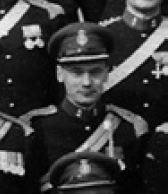Michael Hogge joined the army as a Trooper in the Royal Armoured Corps in 1943 and retired on the 7th October 1980 as a Major General, having been ACGS (OR), Director General of Fighting Vehicles and finally, Deputy Master General of the Ordnance.

In between, he had an active life in three Regiments and on the Staff. Commissioned after two years of training into The Recce Regt.
He joined 6th Airborne Armoured Reconnaissance Regiment in Palestine in October 1945 and transferred on permanent commission to The 3rd The King’s Own Hussars, also in Palestine at the time, where he gained his first Mention in Despatches.
Continuing his military career he became Regimental Technical Adjutant. After the amalgamation of The 3rd and The 7th Hussars to become The Queen’s Own Hussars, he became a squadron leader and then later he was appointed Commanding Officer.
His tour included the difficult period of the withdrawal from Aden, for which he was Mentioned in Despatches again. Thereafter, he filled many jobs on the staff most particularly on the technical armoured side where he excelled and in October 1980 was awarded the CB.
Michael was born at Whitby on 4th August 1925, and educated at Wellington College, before going to Oxford in October 1943 on an Army University Short Course. He died peacefully after a long and debilitating illness on 13th July 2005.
Militarily Michael was one of the wartime vintages – and he with Peter Cavendish, and Jimmy Southall, all joined together with an Oxford University introduction to the army, arriving in the Airborne just in time for the atom bomb to drop and move them from parachuting into Tokyo Bay to landing in Palestine to defend the mandated territories.
Palestine came and went and BAOR (Germany) became the norm, in Michael’s case interspersed with courses, RAC Gunnery, Tank Technical School and others. Staff College in 1958 was followed by the new amalgamated Regiment of which he took command when they were in tanks at Catterick, moved them to Maresfield on conversion to Armoured Cars and hence to the operations in Yemen and final withdrawal from Aden.
After the excitements of command, promotions followed, – Instructor at both the Military College of Science at Shrivenham, and The Staff College at Camberley, with appointments at the MOD; Royal College of Defence Studies and more MOD.
At this stage, roots were extended for Nilla and the two boys born in 1954 and 1956 to Ashbourne Cottage just outside Reigate, where they were able to settle into a bit of peaceful family life for almost the first time. Whence followed his three London-based appointments in armour and procurement at Major General rank.
Installed as General Manager of the Regular Forces Employment Agency in October 1981, Michael devoted himself to this organisation.
About half of the 20,000 leaving the Services each year are placed by this Agency, a huge task that he managed through a large, partly voluntary, staff for eight years.
In The Times Business Diary, there was a three-column article on the success he had achieved.
Concurrently, he helped with SSAFA for 24 years becoming finally County Vice-President. Again in The Times, on this occasion in the letter column, he was praised for ‘he made himself available to anyone who needed assistance on a 24-hour, 365 day a year basis, and was pleased to do so’.
With many other contributions to the County of Surrey, including being Chairman of the Brockham Royal British Legion, he became a Deputy Lieutenant of the County.
His later years were fraught with pain through which he fought nobly, supported magnificently by Nilla, the family and the local community. His memorial service, attended by many of his Regimental and local friends, remembered him with respect and affection, as a great occasion as a memorial to a great life.


